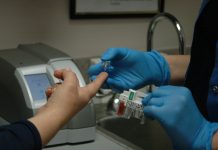
A craving for sweets is not a symptom of diabetes. The fact that you crave sweets at breakfast may not be that unusual. Breakfast means you are breaking a fast from your last meal which was probably the evening before. If you are within your healthy body weight range and do not have diabetes or hypoglycemia then go ahead and eat something sweet for breakfast, but also include some whole grains and protein to keep you satisfied until your next meal. Glucose from sweets can get into your blood within 15 minutes but doesn’t have the lasting power of protein and fat to keep you satisfied to the next meal. Remember to brush your teeth after eating sweets.
Common symptoms of diabetes are excessive thirst and urination, weight loss (in spite of eating enough food) and blurred vision. To further define these symptoms consider the following examples. The excessive thirst is usually described by patients as feeling like feeling dry cotton balls in their mouth. Unless a person is pregnant, on diuretics (pills to reduce water retention) or has prostate enlargement, it is unusual for a person to wake up during the night to urinate. Blurred vision that continues even after a change in eyeglass prescription is highly suggestive of diabetes. If you think you have one or all of these, I would highly recommend you see your doctor who can test your blood glucose, examine you and determine if you have diabetes.
With the exception of pica, food cravings (even those pregnant women experience), are not easily substantiated and often cannot be linked with a nutrient imbalance in your body. There are neurochemicals like serotonin, epinephrine, and norepinephrine that strongly influence our appetite.



